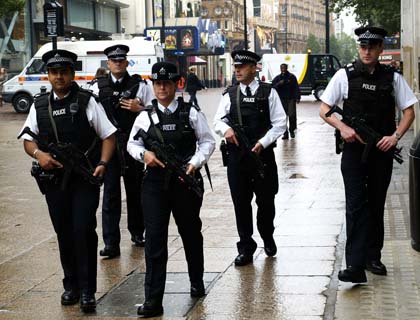The United Kingdom is under threat from home-grown extremist and international terrorist networks. The incidents that occurred in 2011 and the recent court decision against some violent extremist elements can be classified as a new wave of subversion. The August 2011 and other incidents raised public concern and endangered the social transformation process in the country. Research institutions and newspapers carried out surveys and research article to identify the causes of unrest and the campaign of kill and burn. The government planned to arrest more than 20,000 criminals and extremist elements to make sure the security of the Olympic and Paralympics in 2012.
A part from the government institutions and police administration, an increasing numbers of academic institutions and individuals are struggling to address the issue of social alienation, racism, sectarianism, extremism and prevailing criminal culture in much deeper sense, but terror and takfiri jihadi mafia is much stronger than the government perceptions and have become a bigger security challenge. All terror and extremist networks who pose security threat to the UK seek to train more people and expand their networks to towns and villages.
The recent arrival of thousands unchecked extremist and terror suspects into the UK has caused deep concern for both the public and government circles. The government understands all these developments, security threats and the arrival of more Mujahedeen, but less succeeded to address the issue positively instead changing strategies and plans every year. But this is not the solution. Terror and dissident groups across the country are adopting new strategized and plans and trying to fail the government security arrangements.
A new development in the strategy of Northern Ireland dissidents groups disappointed government authorities who have been struggling to tackle the menace in a technical way. Senior counter terrorism circles have worried about the new tactics and way of attacks of dissidents groups based in the region. Intelligence circles have recently pointed that to a growing possibility of dissident's bomb making technique and a wide ranging attacks techniques. It must be born in mind that sectarian groups in Northern Ireland have recently deployed command-wire explosive device, van-mounted weaponry and car bomb. Improvised explosive Device has already been their effective weapon since a decade.
This is not exaggeration, the strength and expertise of the home-grown extremist and terrorist groups can be judged from the frustration of the government and its administration that introduce new counter terrorism plans, strategies and measures two to three times a year. From the law and order point of view, these measure and plans are no doubt of much importance but unfortunately, less satisfactory. Britain's home grown extremist returning from Middle East, Gulf, Afghanistan, Pakistan and Bangladesh are posing a growing "lone wolf" threat to the security of the country.
This is a new emerging threat. From Somalia, more than fifty well-trained home-grown extremist are expected to arrive very soon. The involvement of these groups in the civil war of Arab and African states, in Pakistan and Afghanistan has become the center of considerable debate in the government and intellectual circles. Recently, some members of these groups have returned to Britain with new ideas, resolve and messages. They received military training and refreshed their minds with more transmogrified sectarian ideas. Now they can constitute improvised explosive device and other explosive material easily.
In July 2011 government announced the revised prevent strategy with three objectives. The main target of the strategy is to challenge ideologies that support terrorism and those who promote it. The strategy resolve is to protect vulnerable people; and supports sectors and institutions where there are risks of radicalization. For Muslim communities, the strategy has outlined some instruction and warned that the ideology of extremism and terrorism is a bigger problem.
In its instructions to the Muslims of the country it has warned: "Ensure your imam is aware of all 'legitimate beliefs' as only these can be preached in sermons or taught in prayer groups and mosques. Otherwise he will be deemed an ideologue with the congregation at risk of radicalization and becoming suicide bombers." No doubt, the government is committed to a prevent strategy, but the strategy has not been fully effective in the past several years. The country still faces the threat of terrorism and extremism while the strategy raised several questions in the mind of a literary man.
Attack on the UK's institutions computer has been a challenging problem. I my article published in Daily Outlook Afghanistan in November 2008, what I warned about the threat of cyber terror attacks become realty. A month later, various state institutions including FCO experienced thousands cyber attacks. Internet is no longer just about e-mail and website. This machine empowers the growing list of revenue-generating e-business activities.
In near future, cyber terrorism and economic jihad will ultimately target all Britain state institutions as it has been a driving force behind the modernization of Russia, China and Indian economy and military industry. Terrorists may use computer not only to inflict damage in security infrastructure but to disrupt the whole communication system.
As these groups have frequently stated that they will launch a large scale attacks, there is more possibility that these attacks will be carried out by their trained members. In my understanding, states like China, Russia, India, Iran and Pakistan have established well-trained cyber armies fighting a tenacious financial war against the US, UK and Europe. China has a significant cyber weapons and intelligence infrastructure in place today.
Terror and extremist groups are abusing the opine mindedness of the UK universities. These people promote an ideology which is completely against British values. Finally, Security sector reforms and the reorganization of Britain's police administration may help countering the above mentioned security threats effectively. The issue of racism needs to settled and the colourful face of the country needs to be maintained in a better way.

